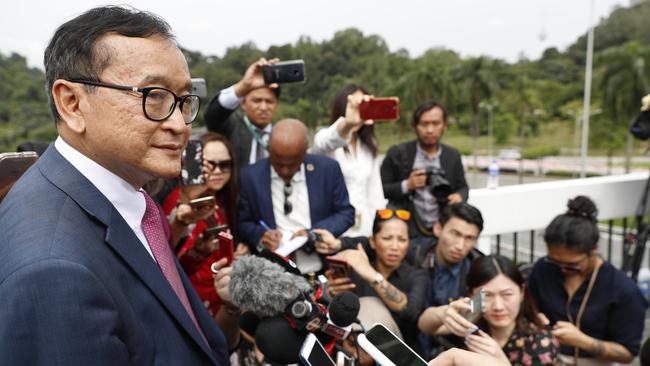Tide turns on Cambodia’s Hun Sen: Sam Rainsy
Cambodia’s Hun Sen regime has ordered the release of more than 70 banned Cambodian National Rescue Party activists.

Cambodia’s acting opposition leader Sam Rainsy said on Thursday the “tide is turning” on the Hun Sen regime after the strongman ordered the release of more than 70 banned Cambodian National Rescue Party activists arrested on charges of trying to overthrow the government.
It was the second concession this week by Prime Minister Hun Sen, who on Sunday partially lifted the house arrest of CNRP president Kem Sokha in response to EU pressure to uphold democracy and human rights in return for maintaining Cambodia’s preferential access to EU markets.
“There are over 70 people, please hurry up work on this case so that these brothers can be released on bail,” Hun Sen said in a speech directed at judicial authorities.
Dozens of opposition activists were arrested in the lead-up to Mr Rainsy’s planned return last Saturday from self-imposed exile, which was called off after troops were deployed to the border with Thailand and Thai Airways blocked him from boarding a flight from Paris to Bangkok.
Airline carriers servicing Cambodian routes were also warned that allowing the 70-year-old to board a flight home would be akin to abetting a coup.
The EU this week gave Phnom Penh a month to respond to a new report into the declining human, political and labour rights situation or face possible withdrawal of tariff-free access to EU markets — worth more than $7bn to its ailing economy.
It has not released the report but an EU statement this week called for “immediate action to open the political space in (Cambodia) to establish the necessary conditions for a credible, democratic opposition”.
“In particular, we expect Kem Sokha to be fully released and his political rights reinstated so that he can play a full part in political life. We also expect the Cambodian authorities to reinstate the political rights of all opposition members banned from political life and to fully release all opposition members, supporters and activists recently put under detention.”
Hun Sen’s Cambodian People’s Party won all 125 seats in last year’s election after arresting Mr Kem Sokha, dissolving the opposition and cracking down on media and civil society. Yet discontent is mounting among Cambodians struggling to make ends meet in a shrinking jobs market, while a flood of Chinese investment brings little to no benefit.
Mr Rainsy, who flew into Jakarta for meetings with “important political” figures on Thursday, told The Australian “the situation was moving quickly in Cambodia”.
“I think the tide is turning,” he said. “We expect the situation will now move fast because of internal and external pressures. External pressure is playing a more and more important role after the release of the EU report.”
He was “very encouraged to see Indonesia and Malaysia spearheading a movement” within ASEAN to champion human rights over the association’s traditional policy of non-interference.
Yet Mr Rainsy’s arrival in Jakarta very nearly didn’t happen after he was barred from boarding a Malaysian Airlines flight on Wednesday, despite Indonesian immigration insisting he was not on any government blacklist.
Malaysian Airlines later released a statement saying it had acted “under the instruction of the Indonesian authorities”, which Jakarta has since claimed were “old”.
On Thursday, the CNRP leader maintained that his “version” of events was that he missed his flight, explaining he did “not want to cause any embarrassment to my host country”. He is understood to have met this week with Malaysian Foreign Minister Saifuddin Abdullah, and had meetings scheduled on Thursday with MPs from the ruling Indonesian Democratic Party of Struggle.
Amid scepticism over his commitment to return to Cambodia, Mr Rainsy said “he had done everything possible to do so” and would stay in Southeast Asia to plan an attempted homecoming in “coming days”.
Griffith University’s Lee Morgenbesser said his repeated failure to follow through with his promised return highlighted the need for fresh young leaders to fight for the restoration of Cambodian democracy. “Sam Rainsy is important in the sense he can shine a light on the problem but whether the attention stays long enough for them to achieve their goals … I don’t think so.
“He has been competing with Hun Sen for more than 20 years and has not really moved the ball down the pitch much.”




To join the conversation, please log in. Don't have an account? Register
Join the conversation, you are commenting as Logout